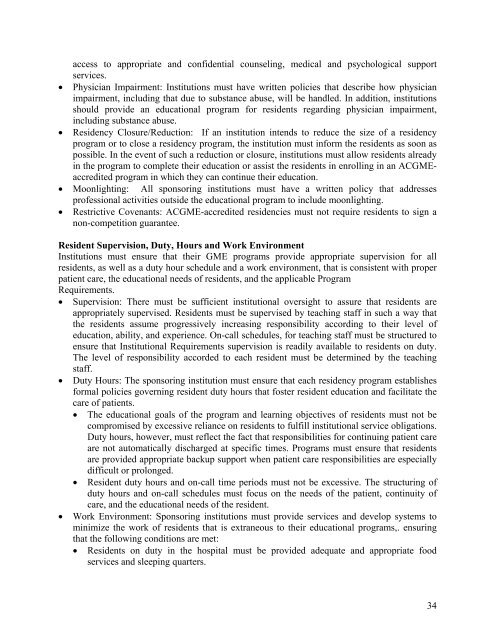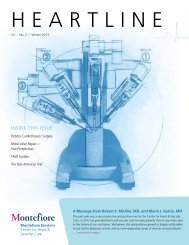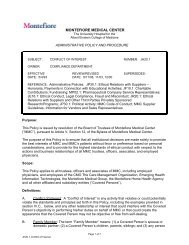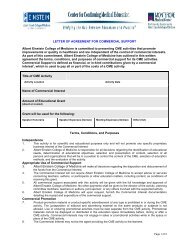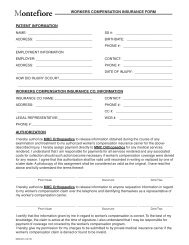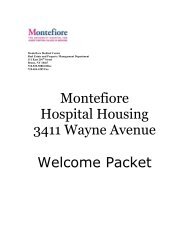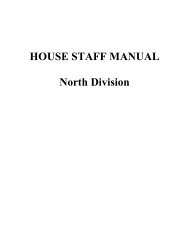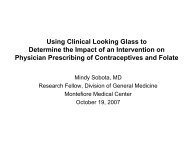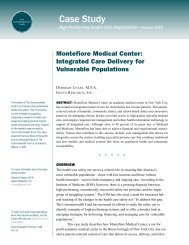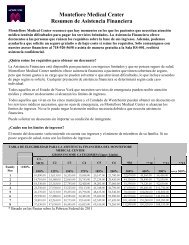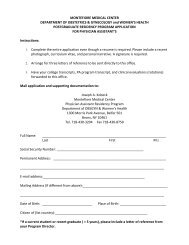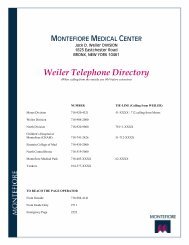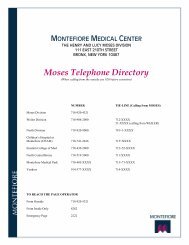Medical Staff House Staff Orientation Manual - Montefiore Medical ...
Medical Staff House Staff Orientation Manual - Montefiore Medical ...
Medical Staff House Staff Orientation Manual - Montefiore Medical ...
Create successful ePaper yourself
Turn your PDF publications into a flip-book with our unique Google optimized e-Paper software.
access to appropriate and confidential counseling, medical and psychological support<br />
services.<br />
• Physician Impairment: Institutions must have written policies that describe how physician<br />
impairment, including that due to substance abuse, will be handled. In addition, institutions<br />
should provide an educational program for residents regarding physician impairment,<br />
including substance abuse.<br />
• Residency Closure/Reduction: If an institution intends to reduce the size of a residency<br />
program or to close a residency program, the institution must inform the residents as soon as<br />
possible. In the event of such a reduction or closure, institutions must allow residents already<br />
in the program to complete their education or assist the residents in enrolling in an ACGMEaccredited<br />
program in which they can continue their education.<br />
• Moonlighting: All sponsoring institutions must have a written policy that addresses<br />
professional activities outside the educational program to include moonlighting.<br />
• Restrictive Covenants: ACGME-accredited residencies must not require residents to sign a<br />
non-competition guarantee.<br />
Resident Supervision, Duty, Hours and Work Environment<br />
Institutions must ensure that their GME programs provide appropriate supervision for all<br />
residents, as well as a duty hour schedule and a work environment, that is consistent with proper<br />
patient care, the educational needs of residents, and the applicable Program<br />
Requirements.<br />
• Supervision: There must be sufficient institutional oversight to assure that residents are<br />
appropriately supervised. Residents must be supervised by teaching staff in such a way that<br />
the residents assume progressively increasing responsibility according to their level of<br />
education, ability, and experience. On-call schedules, for teaching staff must be structured to<br />
ensure that Institutional Requirements supervision is readily available to residents on duty.<br />
The level of responsibility accorded to each resident must be determined by the teaching<br />
staff.<br />
• Duty Hours: The sponsoring institution must ensure that each residency program establishes<br />
formal policies governing resident duty hours that foster resident education and facilitate the<br />
care of patients.<br />
• The educational goals of the program and learning objectives of residents must not be<br />
compromised by excessive reliance on residents to fulfill institutional service obligations.<br />
Duty hours, however, must reflect the fact that responsibilities for continuing patient care<br />
are not automatically discharged at specific times. Programs must ensure that residents<br />
are provided appropriate backup support when patient care responsibilities are especially<br />
difficult or prolonged.<br />
• Resident duty hours and on-call time periods must not be excessive. The structuring of<br />
duty hours and on-call schedules must focus on the needs of the patient, continuity of<br />
care, and the educational needs of the resident.<br />
• Work Environment: Sponsoring institutions must provide services and develop systems to<br />
minimize the work of residents that is extraneous to their educational programs,. ensuring<br />
that the following conditions are met:<br />
• Residents on duty in the hospital must be provided adequate and appropriate food<br />
services and sleeping quarters.<br />
34


